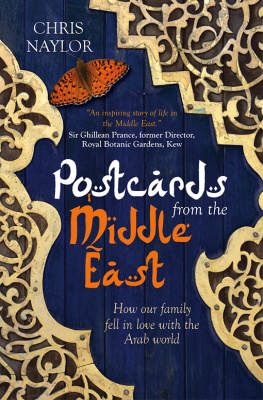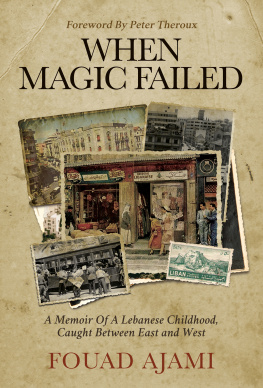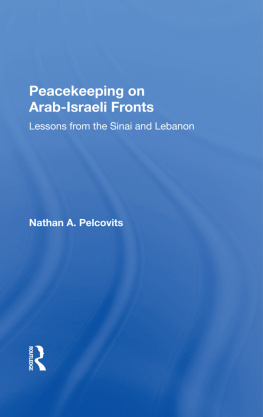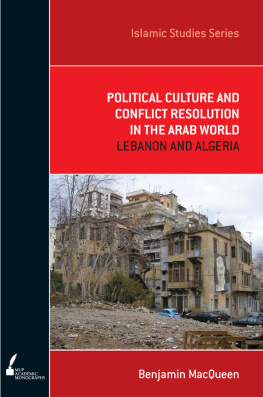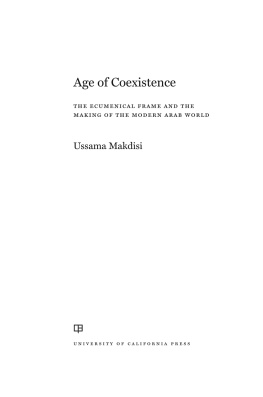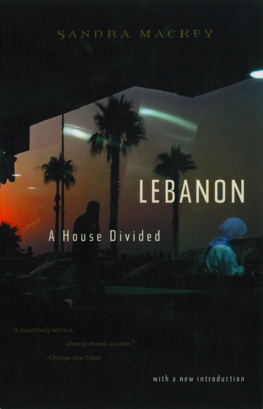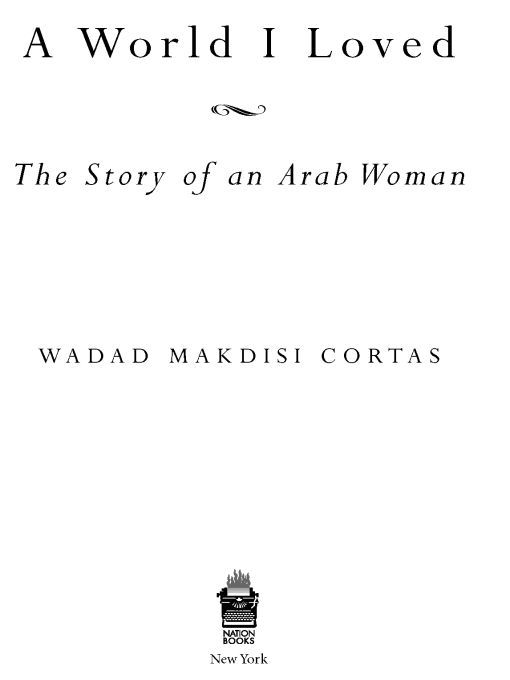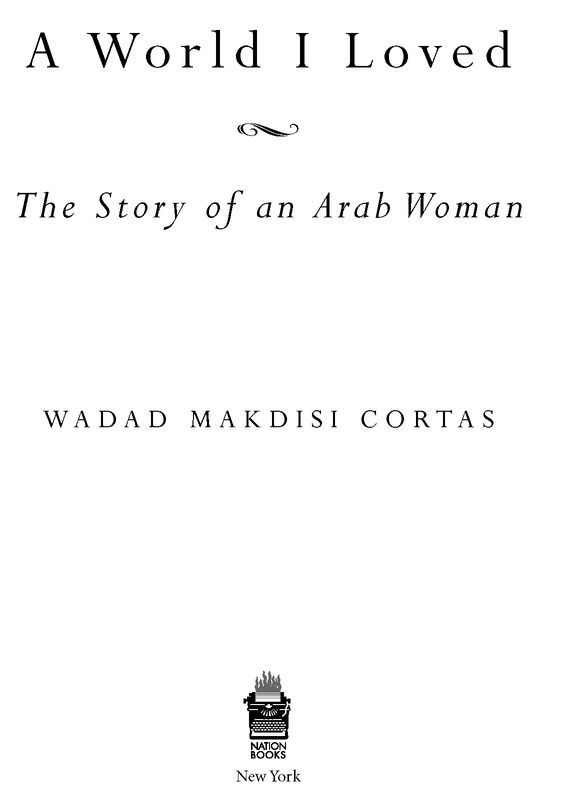Table of Contents
PRAISE FOR A World I Loved
Wadad Makdisi Cortas has written a treasure of a memoir evoking through poetic prose a world long gone. It begins with the early part of the twentieth century before the colonial exploits of the Western European powers ravaged the Middle East and turned it into the mess we know today. In so doing it brilliantly puts the present reality in the context of a past long gone, opening a window on a world we need to experience if we are to understand where to go from here.
RAJA SHEHADEH, author ofStrangers in the HouseandPalestinian Walks: Forays into a Vanishing Landscape
Wadad Makdisi Cortas has written a remarkable memoir that manages to chart the darkening of the Arab world in the key period from the First World War and the Balfour declaration to the Lebanese civil war of the 1970s, while also cherishing its uniqueness. It is the story of an inspiring, independent woman who devoted her life unswervingly to the education of her people.... The Arab world loved by Makdisi Cortas, a world of Muslim, Christians and Jews where there were no strangers, can still today provide a model and hope for the future.
JACQUELINE ROSE, author ofThe Last ResistanceandThe Question of Zion
A World I Loved takes us back to a pocket of Arab historya brief moment, alaswhen the enchantment with secularism was real, when flirtation with things liberal hinted at a future of moderation and tolerance. In her own life and work, Wadad Makdisi Cortas personified that age and its promise. A World I Loved is an elegant, sensitive account of her remarkable story.
HANAN AL-SHAYKH, author ofThe Story of Zahra,Beirut Blues, andThe Locust and the Bird
The rare, evocative story of a private life that bears witness to the rich joys and wrenching sorrows of the 20th century Middle East.
JEAN STROUSE, author ofAlice James: A BiographyandMorgan: American Financier
A World I Loved is the work of a Lebanese woman whose life has been dominated by war. Wadad Makdisi Cortas was our Passion-aria ; a brilliant fighter, a rebel. But the arms she trusted were peaceful resistance, and education. Her narrative is seamless: the personal and the historical interaction in her book is one of the most meaningful and endearing covering of the Arab East in the 20th century, giving through personal testimony, soul and voice to millions of people sacrificed on the altar of world politics.
ETEL ADNAN, author ofSitt Marie RoseandIn the Heart of the Heart of Another Country
Wadad Makdisi Cortas elegantly interweaves fascinating personal narrative with subtle reflections upon the great political and social questions of her day: the transition from the Ottoman Empire to the mandate system; the rise of the nation state; the colonisation of Palestine and the struggle for its freedom; Nasserism; the tragedy of the Lebanese civil war; the fight for womens equality; the role of educators and the arts. Makdisi Cortas is the truest companion on this epic journey, inviting the reader to travel with her in the diverse worlds of Ottoman Syria, colonial Baghdad, mandate Jerusalem, depression-era America and 1960s Beirut. Out of fragments shattered by war and loss, she creates a crystal clear image of the world she loved and helped create, a world underpinned by artistic vision and triumphant humanity.
KARMA NABULSI, Oxford academic and former PLO representative
This is far more than a memoir of a determined and independent-thinking Arab woman. It is a window into the many tragedies that affected the peoples of the Middle East in the course of the twentieth century. Yet, at the same time, reading the book transported me to happier times of carefree childhoods and lasting relationships that come from living in a world where everyone knows everyone else for a lifetime. Despite decades of political turmoil and social change, the spirit of people like Wadad Cortas is a testimony to the endurance of the human spirit.
DR. LEILA FAWAZ, Issam M. Fares Professor of Lebanese and Eastern Mediterranean Studies, Tufts University
This book is dedicated to all of my mothers
former students, colleagues, relatives, and friends
who knew and admired her.
Had it not been for Jo Ann Wypijewskis
meticulous editing, immense knowledge of
the politics of the region, perception, and
sensitive rendering, this book would not
have seen the light of day. For this she has
my eternal gratitude and admiration.
MARIAM C. SAID
Foreword
NADINE GORDIMER
There is a vast library of books about the Middle East, the majority, in the present, dominated by the Palestine-Israeli conflict. Here is a work like no other in that library. To begin with, Wadad Makdisi Cortas is neither a Muslim nor a Jew. She is a Christian, but as she sets down on her first page, hers is the story of an Arab woman. And in her account of her life in Beirut there is no contradiction in this identity that represents a resolution between two opposing forces of human faith and power that have existed since before the Crusades.
Born in 1909 in Beirut, she is an original in all the best senses of the admiring term. Her account of her life up to the late 1970s is remembered with sharp intellect, vivid awareness of the political circumstances that form her judgments, critical and self-critical of the value she arrived at. There is no political rhetoric, although her perceptions of the machinations of the colonial powers, France and Britain, combining when it suited them in common purpose to retain possession of Arab lands after the First World War, are astute. There is no rhetoric in her calm and sometimes delightfully wry perceptions of the difficulties she had to overcome as a femalealthough not a Muslimin claiming independence of thought and activity, which feminists might wish proudly to claim on her behalf. Her childhood in a well-educated, worldly family gave her that sense of the place of humans not above but in the world of nature, which brings her writing a feel for landscape, the beauty of sea, sky, and earth as the support needed to keep balance in the assault of disorder and violence that has disrupted life in her part of the world.
She had opportunities to further her education and fulfill her intention to become a teacher. In America she found among her Indian and Arab students how much we had in common against colonialism. Back in Beirut she became principal of the national Ahliah School for Girls, where she was to spend her entire working life, if one can restrict such a woman for whom acceptance or personal responsibility toward agencies of justice and fulfillment of life for others was more than a career. Palestine was under British Mandate; Lebanon was under French Mandate. Like a stray bird returning to its home, I yearned to speak my language, to read Arabic books, and to foster Arab independence and solidarity, she writes. But under the academic program forced on the school by the French ministry, instruction was in French. Her bizarre professional situation was decreed under a wider colonial one. Lebanon became independent of France only in 1943, but even then France maintained an armed presence until 1946. The honesty of her reaction to a colonial educational edict is strikingly admitted: How much of a compromise should I make to come to terms with my own people? That question preoccupied me as I could see that bit by bit Lebanon was being detached from its Arab roots. That compromise could not have been easy; for her it did not lead to rejection of anyone, while asserting the rights of ones own people. This was clearly no grand abstraction, it was in the practice of daily life. At her school there was a component of girls who were not Arab, neither Muslim nor Christian, even a few Jewish girls. None were discriminated against by headmistress, teachers, or other pupils; and at a distance of time this reads, rather than as an anachronism, as a microcosm of the future world Wadad Makdisi Cortas believed must be discovered, attained by human determination.


